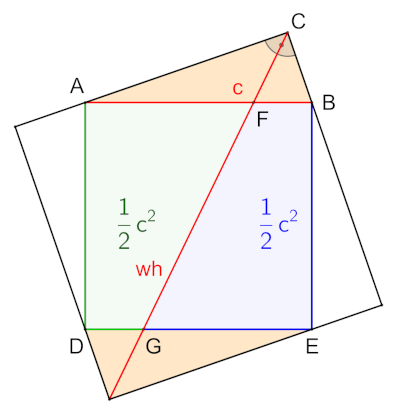opiniaster
n. one who obstinately holds to an opinion
Search Results for: in a word
In a Word
afterwit
n. knowledge gained too late to do any good
In a Word
jentacular
adj. pertaining to breakfast
In a Word
hadeharia
n. constant use of the word “hell”
In a Word
wittol
n. a man who knows of and tolerates his wife’s infidelity
Proof Without Words

In any right triangle, the angle bisector of the right angle divides the square on the hypotenuse into two congruent trapezoids.
Words and Numbers
fIVe + sIX + seVen
5 + 6 + 7 = 18
IV + IX + V = 18
These are the only three consecutive numbers whose sum equals that of the Roman numerals embedded in their names.
Last Words
In The King’s English (1997), Kingsley Amis cites an old joke that illustrates the confusing distinction between shall and will:
A swimmer in difficulties was heard to shout, ‘I will drown and nobody shall save me.’ At an inquest on the unfortunate fellow, English jurors wanted a verdict of suicide, Scottish jurors a verdict of death by misadventure, and MacTavish pressed for a rider or footnote rebuking witnesses for making no effort to rescue the victim.
Under the old rule, I shall indicated a prediction and I will denoted a promise or threat. Confusingly, in the second and third persons these meanings were reversed, so that you/she will indicated simple futurity and you/she shall denoted an intention or command. Still more confusingly, old-fashioned speakers of Scottish English reversed this whole understanding of the matter. So while the English jurors thought the swimmer was saying, “It is my intention to drown, and it is my express desire that nobody try to save me,” the Scots took him to say, “I am going to drown and it seems that nobody is going to save me.”
All this has only grown more confused with the popularity of contractions such as I’ll and you’ll, and Americans have generally dispensed with shall and use will for everything. Of the joke, Amis writes, “Nobody tells that one today.”
Overspecialized Words
Some words become famous for their implausibly specific definitions:
ucalegon: a neighbor whose house is on fire
nosarian: one who argues that there is no limit to the possible largeness of a nose
undoctor: to make unlike a doctor
Mrs. Byrne’s Dictionary of Unusual, Obscure, and Preposterous Words, by Josefa Heifetz Byrne, collects examples ranging from atpatruus (“a great-grandfather’s grandfather’s brother”) to zumbooruk (“a small cannon fired from the back of a camel”). My own favorite is groak, “to watch people silently while they’re eating, hoping they will ask you to join them.”
Alas, most of these don’t appear in the magisterial Oxford English Dictionary. Accordingly, in 1981 Jeff Grant burrowed his way into the OED in a deliberate search for obscure words. When he reached the end of A he sent his 10 favorite finds to the British magazine Logophile:
acersecomic: one whose hair was never cut
acroteriasm: the act of cutting off the extreme parts of the body, when putrefied, with a saw
alerion: an eagle without beak or feet
all-flower-water: cow’s urine, as a remedy
ambilevous: left-handed on both sides
amphisbaenous: walking equally in opposite directions
andabatarian: struggling while blindfolded
anemocracy: government by wind
artolatry: the worship of bread
autocoprophagous: eating one’s own dung
“I have been working slowly through ‘B’ and so far my favourite is definitely ‘bangstry’, defined as ‘masterful violence’, an obsolete term that is surely overdue for a comeback.”
(From Word Ways, November 1981.)
Late Word

A week after songwriter Jim Croce died in a plane crash in 1973, his wife, Ingrid Jacobson, received this letter:
Dear Ing,
I know I haven’t been very nice to you for some time, but I thought it might be of some comfort, Sweet Thing, to understand that you haven’t been the only recipient of JC’s manipulations. But since you can’t hear me and can’t see me, I can’t bullshit, using my sneaky logic and facial movements. I have to write it all down instead, which is lots more permanent. So it can be re-read instead of re-membered, so, it’s really right on the line.
I know that you see me for who I am, or should I say, as who I are. ‘Cause I’ve been lots of people. If Medusa had personalities or attitudes instead of snakes for her features, her name would have been Jim Croce. But that’s unfair to you and it’s also unhealthy for me. And I now want to be the oldest man around, a man with a face full of wrinkles and lots of wisdom.
So this is a birth note, Baby. And when I get back everything will be different. We’re gonna have a life together, Ing, I promise. I’m gonna concentrate on my health. I’m gonna become a public hermit. I’m gonna get my Master’s Degree. I’m gonna write short stories and movie scripts. Who knows, I might even get a tan.
Give a kiss to my little man and tell him Daddy loves him.Remember, it’s the first sixty years that count and I’ve got 30 to go.
I Love you,
Jim
(From Ingrid’s 2012 memoir, I Got a Name: The Jim Croce Story.)
